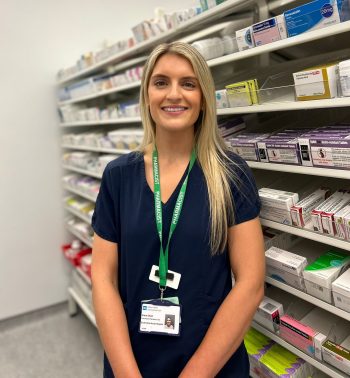10/09/2024

How long have you been in your current role?
“I started this post in June 2024. I am new to the trust also, previously working in Craigavon Area Hospital.”
Tell a little about your career before becoming a SPCP?
“I qualified as a pharmacist in 2018. I started my pharmacy career working in community pharmacy for a short time, however my interest lay with hospital pharmacy. I accepted a post working in Antrim Area Hospital where I rotated through various clinical areas including admissions, respiratory, cardiology, surgery, endocrine and maternity and gynae. In 2021 I accepted a post in Craigavon Area Hospital working as an admission, emergency department and ambulatory care unit which was a cardiac, rheumatology and respiratory rapid access unit. I have thoroughly enjoyed my experience to date.”
What made you decide to become a SPCP?
“When I worked in the emergency department in Craigavon area hospital I had encountered palliative patients and liaised with the Specialist Palliative Care Team (SPCT). Their palliative clinical knowledge was always remarkable but moreover was their ability to manage patients and their families on a holistic level. I admired their compassion and empathy towards these patients and their families and their delicate yet direct communication skills when breaking difficult news. In the NHSCT I had worked alongside an excellent SPCP who illustrated how pharmacists are well placed to support medicine needs of palliative and end of life care (PEOLC) patients in delivering safe, effective and patient-focused care. Her work further inspired me towards a career as a SPCP and how useful this role is within the MDT.”
What is the role of a SPCP?
“The SPCP is a new role to the Western Trust. I support patients and their families with medicine and PEOLC needs in the acute, community and hospice setting. I offer support and medication counselling around symptom management such as pain, breathlessness, nausea and vomiting, anxiety, delirium and agitation and noisy respiratory secretions in their preferred place of care as they approach the end of their life and avoid inappropriate hospital admission. I also support patient – focused decisions regarding de-prescribing and support health care professionals in de-prescribing decisions. An important part of this role is to promote the importance of and improve access to anticipatory medicines to manage symptoms in the last days of life. My work also involves the development of the “Just – in – Case” prescribing to ensure seamless supply and administration of anticipatory medicines. I am also a non-medical prescriber and hope to utilise this skill within palliative care in the coming months working as part of the MDT. As well as patient – facing, other parts of the SPCP role includes providing education to other professionals in the multi-disciplinary team, developing clinical guidelines, oversee audit and research and medicine governance.”
Are there any moments/things that you found particularly challenging and/or rewarding about your role?
“Being a Specialist Palliative Care Pharmacist is a really fulfilling job. Although the emotional impact can be a challenging aspect of the job, I have found that being able to contribute towards improving people’s quality of life and to helping them to live well live well despite their life limiting illness very worthwhile. Palliative Care can be delivered over varying periods of time with some people living with a palliative condition for years whilst sadly others time may be limited. In this case where time is limited any person with an advanced non-curative condition has the right to a “good death” irrespective of their condition or care setting. It is important to acknowledge that dying matters. There is only one chance to get it right with end of life care so being involved in this part of someone’s journey is very humbling and rewarding.”
“What I have found most valuable about the role is my input with symptom management for patients in community. Often patient’s preferred place of care is in their homes. Being able to fulfil this wish and prevent inappropriate hospital admissions has been so worthwhile. This is only possible with good working relations with GPs, practice pharmacists and community pharmacists. In a time of sorrow, worry and pain, families have shown so much gratitude for the work of the specialist palliative care team. Being part of this team is a wonderful thing.”




